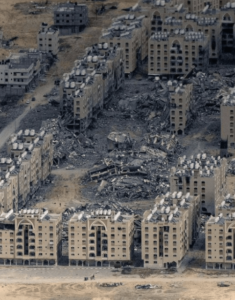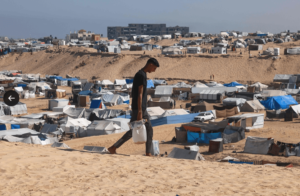Israel reopens Gaza crossing
Israel’s security cabinet has granted permission for the reopening of Erez crossing (Beit Hanoun), linking Israel and Northern Gaza, marking the first time the border has reopened since the October 7 attacks carried out by Hamas. According to a CNN report on Thursday, an Israeli official had stated that in addition to the opening of Gaza border, the cabinet also approved the transport of humanitarian aid from the port city of Ashdod.

The report came mere hours after US President Joe Biden conversed over call with Israeli PM Benjamin Netanyahu, addressing the extreme humanitarian crisis in Gaza and warned the PM of serious consequences unless appropriate steps are taken.
During October 7 Hamas attacks, the Erez crossing was one of the important border crossings that was overrun by nearly 3,000 Hamas militants allowing them direct access into the country. The attacks claimed the lives of 1,200 civilians with 250 others taken hostage by the militant outfit.
In retaliation, on 27 October 2023 Israel declared war on Gaza and the rest is history.
Israel-Hamas war: An escalating humanitarian crisis
5 months, 4 weeks and 1 day have passed since the tiny enclave of Gaza, bordered by Israel and Egypt has been a hotbed of conflict and humanitarian crisis. Many world organizations including ICJ (International Criminal Court), have accused IDF (Israeli defence Forces) of purposely targeting civilian infrastructures in the course of the conflict in a bid to make the Gaza strip uninhabitable. The volatile nature of the conflict has also taken the lives of many journalists & medical professionals in the country. The most recent of which, was the death of seven aid workers of the World Central Kitchen in Gaza, in what the IDF called an accidental air strike.
Israeli authorities took responsibility of the airstrike but maintained that it was an accidental not intentional. According to a report from Reuters, till date, 35% of all buildings in Gaza have been destroyed, with an estimated damage to 88,868 structures as a direct result of Israeli airstrikes.

Gaza Health Ministry estimates approximately 33,000 Palestinians have been killed so far, due to IDF’s incessant airstrikes and destruction of healthcare facilities in Gaza, since the beginning of the offensive. A large number of these casualties are reportedly children.
Nearly hundreds and thousands of unverified social media posts have emerged from Gaza, since the beginning of the offensive. Often painting a very brutal and grim picture of the on-ground realities of the offensive.
A joint study by the London School of Hygiene and Tropical Medicine & the Johns Hopkins Centre for Humanitarian Health at Johns Hopkins University conducted in February 2024, estimated that at the current course of conflict, the final death toll will result in 58,620- 74,290 excess deaths.
International calls for ceasefire in Israel-Hamas war
Although the method of implementation for the reopening remains uncertain, a spokesperson for UN Secretary General, Stephane Dujarric said in a statement on Thursday, “This is positive news but, of course, we will have to see how this is implemented. We need a humanitarian ceasefire and a massive influx of aid.”
In addition to the rising death toll, IDF has continued to impose stringent limitations on Gaza’s primary humanitarian organization, United Nations Relief and Works Agency for Palestine Refugees in the east (UNRWA). Latest estimates of the organisation states that nearly 1.2 million people of northern Gaza are famine stricken, with hundreds of reports of death by starvation.

Despite global attempts to provide relief, Israel has time and over, prevented the movement of aid shipments into Gaza. In fact, after the October 7 Hamas attacks, Israel’s Defence Minister, Yoav Gallant had vowed to stop the supply of food, water, electricity and fuel into Gaza.
Repeated attempts of negotiating a cease fire by world leaders and organisations have failed time and again. With Israeli authorities citing the continued presence of Israeli civilians’ hostages by Hamas as a major obstacle to agreeing to any ceasefire arrangement. They argue that such an agreement would compromise the safety of these civilians. Despite repeated attempts at diplomacy, a consensus is yet to be reached, prolonging the conflict and exacerbating the humanitarian crisis in the region.












Comments 1